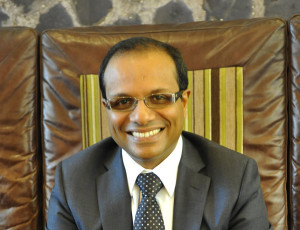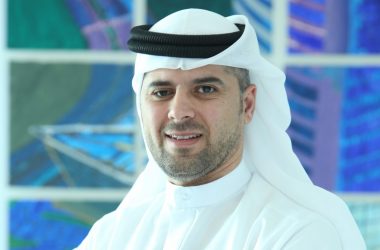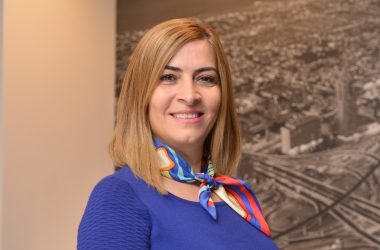
For Faizal Eledath, three has always been the magic number. Via his illustrious international career, he has developed an ethic of patience and precision, which translates into a smoother working environment for his IT teams, and long-term growth and stability for his employers. “The ‘three-year strategy’ defines the way I work,” Eledath says. “I believe it takes time to change an organisation for the better, to define its long term goals. The people driving technology are more important than the technology itself; in my hands a Ferrari is no good, but with a professional driver behind the wheel it’s a different story.”
Raised in Kerala, India, Eledath’s stint at boarding school taught him “The role of humans as social creatures, and the importance of independence.” He moved on to Bharathiar University, where he studied for a degree in Computer Engineering. “The subject was relatively new at the time, but the chance to build applications for the real world was a fantastic experience,” he says.
Eledath then took the bold leap of moving 7,000 miles across the world to study for a Master’s degree in Computer Science Engineering at the University of Alabama in the United States, followed by an MBA at the University of Southern New Hampshire. He describes the experience as a shock on a number of fronts, “There were a lot of things to get used to in America,” he says. “The culture, the teaching style, the weather! The experience taught me so much, and not just in the classroom. I owe so much to the family who hosted me in Alabama, they showed me the U.S., helped bring me out of my shell and build confidence.”
Eledath returned home for a brief period, before moving to Oman to live with an uncle in 1992, and then began full-time employment as a Systems Analyst at Oman Computer Services. Two years later, he joined Mashreq Bank in the UAE as a Systems Programmer. He would go on to spend 13 years at the firm, and he swiftly rose to the position of Vice President of Alternate IT Channels. In the role, he was responsible for optimising Mashreq’s bank card system, core banking applications and enterprise architecture. He also oversaw work concerning customer touch points, including telebanking and Internet banking. His spell at the company culminated in a four-year stint as SVP of Technology at the company’s subsidiary Mindscape, where he was largely responsible for working with Customer Relationship Management technology. “Mashreq spun off part of its IT as a profit centre, and we catered mainly for other financial firms,” he says.
In 2006, Eledath called time on his lengthy Mashreq stay by moving to Dubai Bank as Chief Information Officer. His initial joining period was particularly arduous as the bank was converting its operations from being commercial to fully Islamic. “We had to complete the conversion groundwork in six months, and the actual migration itself could only take one day,” he says. “If we didn’t migrate on time we would have instantly lost profits, so we had to work very closely with our vendor ecosystem.” Extra pressure was heaped on Eledath as every product had to be Sharia compliant, and the company board had also decided to close the bank’s card business, potentially risking losing customers. He says the process was tough but hugely beneficial, “The real anxiety was retaining clients. We had to build strong working relationships to make sure we didn’t lose business, but the pressure of the whole experience has undoubtedly made me better at my job.”
Unsurprisingly, after three years in the post, Eledath had established a platform to impart his working idealogy. “By that point I’d really started to gather steam,” he says. “My time covering a lot of strategy elements at Mashreq meant I was equipped for the Dubai Bank role. I designed a three-year strategy for the bank with all its long term capabilities in mind.”
2012 would see another key milestone for Dubai Bank, and for Eledath. A merger with Emirates Islamic Bank was on the cards, and this brought inevitable unease for his team, “None of my team had never been through a merger before, but had heard horror stories,” he says. “I was adamant that none of my fantastic team would be out of a job. There was inevitably anxiety, but I did my best to keep the team focused and make them understand how they could provide value-adding innovations.” Fortunately for Eledath’s IT team, no jobs were lost. He says the experience has hardened him for future adversity, “I believe you grow most when you’re stressed,” he says. “There’s no way I’d trade that experience having come out the other side.” Following the success of the merger, Eledath was left reporting to Emirates Islamic Bank’s CEO for the final six months of his tenure, until he opted for a change of job, and country.
The opportunity to return south of the UAE border proved too good to turn down in late 2012, and Eledath joined National Bank of Oman as Chief Information Officer. Having recently completed his two-year anniversary in the role, Eledath has carved out yet another opportunity to implement his meticulous working philosophy. “Now more than ever, IT’s role is as a business enabler, not as a barrier,” he says. “I certainly don’t see myself as a technologist, but as a businessman with technical acumen. I want to instill that mentality into my team, to cultivate the DNA of innovation which can meet the aspirations of the business. I want my team to understand the implications for the systems’ end state, infrastructure, and for people. They need to grasp the idea of ‘this is where we are now, but this is where we want to be in the near future.’”
Eledath attributes a strong start at National Bank of Oman not just to the way he has collaborated with his staff, but to the strong channels of communication that exist between all levels of the company. “There is a smooth level of communication between the top and bottom of the company,” he says. “By ensuring that we have a specific frequency of meetings for varying levels of IT, it means that the transmission of ideas is smooth.” He also believes that the ability to translate technology into business value fully displays his team’s work. “As CIO you have to make technology tangible,” he says. “The business has to understand how it will be benefitted by our work. This is reflected in the board’s support, allowing us to focus 60 percent of our time on new initiatives.”
He also believes that following his first two years in the job, he is now better equipped to serve his customers based on their needs. “There is no ‘us’ and ‘them’ in our conversations,” Eledath says. “We’re now in a very strong position to determine which segments we are best suited to. Doing the right things takes time; there’s no good going into a company straight away and rehashing ideas from your old company. Take three months to understand the organisation, and build a picture for the way forward.”





